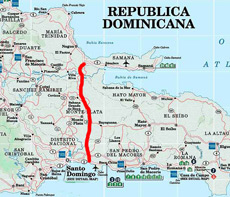
A recent report by Oxfam, “Fiscal Autopsy,” brings to the forefront again the onerous contract first signed in 2001 between the Dominican government and a Colombian company Autopistas del Nordeste C. por A. for the construction of the 106-km long Samaná toll road (Autopista del Nordeste or Juan Pablo II highway). The contract has a clause that has resulted in the country having to pay for the road many times its cost.
Rafael Jovine, author of the study, says that in the first 10 years of the contract the Dominican government has paid double the money the company invested in the road, and 20 more years are remaining on the contract.
An Oxfam report, “Fiscal Autopsy: Assessment of Expenditures and Revenues of the Dominican Government to Guarantee Rights” recalls that the Dominican government signed a contract that establishes a guaranteed minimum income, which if the expected toll collections is not reached, the Dominican state needs to pay the difference. The difference is known as shadow toll and has been paid from year one.
Oxfam explains in the report “Fiscal Autopsy,” prepared by the non-governmental organization, that the cost of paying the shadow toll on the Samaná toll roads increased 38% in 2019, compared to the previous year.
The cost of the two highways The John Paul II and the Atlantic Tourist Boulevard was around US$305 million, or the equivalent of about RD$11 billion at the exchange rate of the time. From 2012 to 2019, the shadow toll subsidy has reached RD$21 billion or US$457 million.
“This does not include the company’s direct collections on tolls. In other words, in only the first eight years of operation of the road, private capital has almost doubled its investment, and it still has 20 years of concession left,” states the Oxfam report.
The agreement for the construction of the highways was as follows: a road concession contract, through which private investment would be responsible for building and directly financing 80% of the total cost of the Northeast Highway (Juan Pablo II) and the Atlantic Tourist Boulevard, in exchange for the Government giving them 30 years of the exclusive right to collect 100% of tolls on both routes.
The contract was originally signed in 2001 by then Public Works Minister Miguel Vargas Maldonado during the government of President Hipólito Mejía. The road nevertheless was built from 2006 to 2011 under the Leonel Fernandez government. The contract was insured by the Multilateral Investment Guarantee Agency (MIGA) of the World Bank. The feasibility study for the highway traffic was carried out by the World Bank.
Read more in Spanish:
Autopsia Fiscal
Diario Libre
Listin Diario
Diario Libre
El Nacional
31 October 2019

